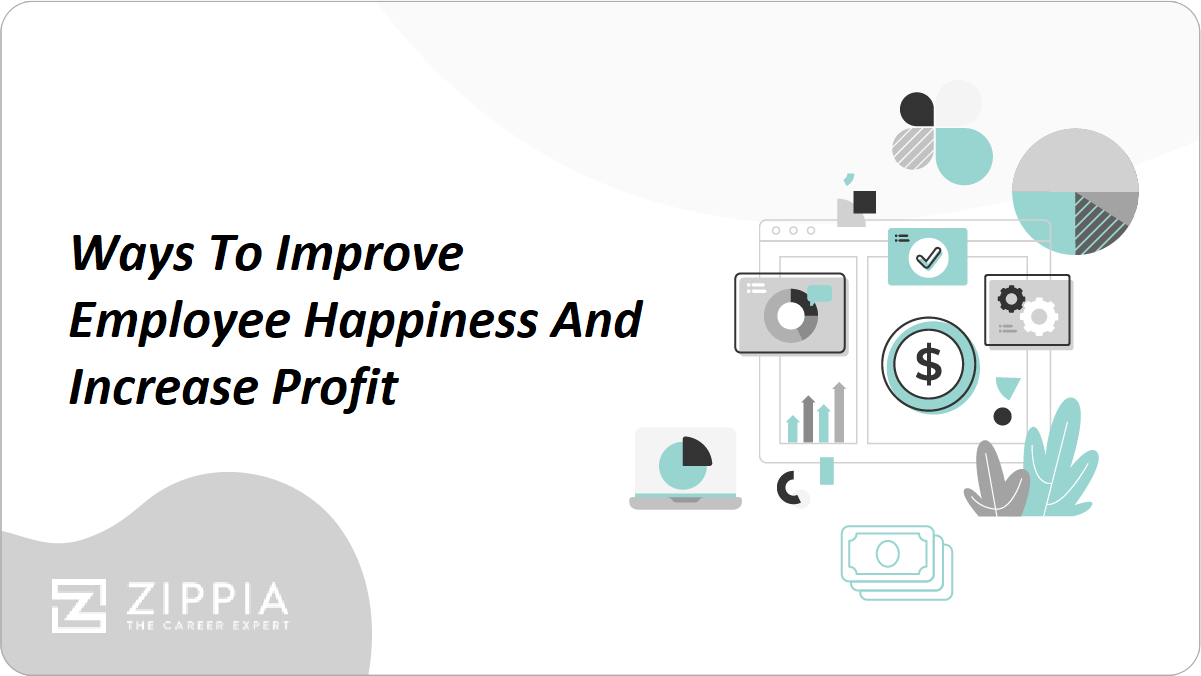Being happy and content where you work is everyone’s dream. Employee happiness is one of the most important factors in running a successful and profitable company.
Employees that are happy tend to be more engaged in the work that they are doing and perform better. Unfortunately, not all employees are happy at work and it is a result of the management.
If you are noticing that your employees are not happy or you have a high turnover rate, it’s time to improve employee happiness to increase your profit. To help you, we have put together why employee happiness matters and ways to improve employee happiness.
Key Takeaways:
-
Happy employees tend to make better and smarter decisions won’t result in mistakes and risk employee safety.
-
Happiness is contagious meaning if a few employees are happy, it can result in the entire team being happy and content.
-
Avoiding micromanaging employees can help build trust and result in a more relaxed and positive working environment.
-
Providing a flexible schedule and a better work-life balance will help decrease stress and improve productivity.
-
Getting to know your employees on a more personal level will help increase work relationship.

Why Employee Happiness Matters
-
Happy employees make better decisions. When employees have less stress anxiety about the job, they are able to make better and smarter decisions. Being stressed can lead to being more distracted which can mean more risks. On the other hand, happy employees are able to make an educated and calculated decision.
-
Better customer service and customer satisfaction. Employees that are happy tend to have a better attitude when it comes to dealing with customers and providing customer service. They will want to spend longer with the customers improving their experience.
This will result in customers being happier and preferring to deal with these employees. This will result in a higher customer satisfaction, creating more sales and client retention.
-
More people will be happy. Happiness can be contagious. When a few employees are happy, it can spread to others on the team, resulting in a more positive environment.
-
Happy employees are healthier. Without the constant stress and being close to burnout, your body is healthier as well. This means they are less likely to take sick days or take personal days to get a break from work.
-
They will care about the work. Happy and content employees care more about the work they are producing and how it will affect the business long term. If they are unhappy and planning on quitting, they might produce half finished projects because they won’t be here to see the results.
-
The company’s reputation will be boosted. Happy employees will tell everyone when they are happy and satisfied. They will speak highly of the company and tell their friends and acquittances to work for the company. This can result in more people wanting to work for your company.
-
They are less likely to quit. When your employees are happy, they won’t want to quit. This will save the company money from constant onboarding and training new employees.
Ways To Increase Employee Happiness
-
Build trust. When employees feel they are trusted to perform their job functions they have the freedom and confidence to engage creatively and participate in solving problems, which in turn creates a feeling of value, maximizing their contribution.
A great way to build trust with your employees is to start delegating tasks. This will show them that you trust them enough to do the work along. Bridging the gap between these levels is the key to high performing and happy employees.
-
Provide feedback. All employee want to know that they are doing the work right and that they are doing a good job. Giving feedback will help them confirm that they are doing the right thing, which will result in them being more confident in their work.
Setting up one-on-one weekly, monthly, or quarterly meetings with your employees will provide the time needed to give them feedback. This is also a great time for them to provide feedback for you to improve anything you need. This communication helps you get a better understanding of what they’re succeeding at and what requires attention.
But feedback is effective only when it is delivered objectively and fairly and should be treated as a tool of instruction, not chastisement or punishment.
-
Respecting your employees. New research suggests that overall happiness in life is more related to how much you are respected and admired by those around you, not to the status that comes from how much money you have stashed in your bank account.
A crucial part of fostering employee engagement is acknowledging and utilizing the unique skills and qualities a person brings to the table. If people aren’t given the chance to use their talents, their level of engagement is reduced and their job commitment diminished. Respect also goes beyond the projects and tasks assigned at work.
-
Prioritize work-life balance. Work-life balance plays a big role in the happiness of employees. If people are always coming in early and staying late, they don’t have much of a life outside of work. This can lead to stress, burnout, and resentment of the job making people unhappy.
Understanding and supporting an employee’s commitments outside of work, such as caring responsibilities or community service activities increases loyalty and job commitment, both of which translate into profit for you.
-
Offer a flexible work schedule. Flexible work options include everything from telecommuting to compressed workweeks and taking extended leave time to attend to family or community commitments. As long as they are getting the work done, offering a flexible schedule will allow them to become more productive.
This also improve the work-life balance and helps employees destress a bit. Ask your employees how they would prefer to work. You may find that some might only want to come to the office for half a day, or working from home is the best option because they are the family caretaker.
-
Providing career growth opportunities. When employees feel as if they are stuck in their job and there is no chance of growth, they can become unhappy. Employees who are fully engaged and demonstrate the ‘nirvana’ that is job satisfaction and initiative won’t want to be put in a corner to beaver away on the same tasks day after day. If you really want someone to be a productive, contributing member of your team next year and the year after that, then offering career growth opportunities is a sure-fire way of making that happen.
Career development enhances employees’ skill sets, which will further enrich your business and it also communicates to employees that they are important members of the team who are expected to learn new and better ways to meet goals and objections. A few ideas are compensating advanced education, funding attendance at conferences and participation in internal mentorship programs.
-
Include your employees. If you want someone to be part of the dream you need to first share the dream with them. People engage more readily in a task or project if they know both the purpose of the task and the contribution their effort will make to a bigger picture.
Spend time ensuring your employees understand the business goals and vision and you will be rewarded with increased levels of engagement. This isn’t just about organizational flow charts, canned mission statements and revenue charts.
-
Set clear expectations and goals. No one wants to start their day not knowing what they should be doing at work. Definable goals give employees a roadmap to both chart their progress and determine the resources needed to accomplish the goals down the line.
Communicating with your workers the tasks for the day, or week, and making sure they understand what the expectations are will help them improve on the work they are doing. No one likes finishing a project, only for the boss to come back and tell them its wrong and to do it again.
-
Recognize their hard work and success. Happy and engaged employees are self-motivated to go above and beyond the call of duty. They take ownership of their tasks and feel pride in completing them to the best of their abilities. But no one will keep this up without some positive feedback. Recognize jobs well done and give credit where it is due – a positive feedback loop will ensure your happy, high-performing employee stays that way.
While many companies offer bonuses and incentives as part of a salary package performance rewards don’t need to be about money for them to be effective. The most effective motivator of all is public recognition, the recipient enjoys elevated social status, the joy of praise and, possibly, increased responsibility and promotional opportunities.
There are many ways to create opportunities to publicly recognize high performance in your organization, incorporate it into every company-wide event you have, have an internal newsletter, introduce an employee of the month award, or just do a “shout-out” in the middle of the office.
-
Get to know your employees. Knowing who is working for you, and having them know you can help improve work relationships. When you get to know them on a more personal level, workers tend to feel more relaxed and comfortable around you.
Take a lap around the office a couple times a day, or message them through out the day if you are remote, and just have a quick chat with them. This is also an informal way to provide some feedback and get an understanding of what they are working on.
-
Have open communication. Without proper communication, no one will know what is going on. Practicing open communication can help improve the work relationships between managers and employees.
Employee happiness increases when they feel free to speak their minds and share their ideas with managers and higher ups. They won’t feel like they will be reprimanded or fired for speaking out against an idea that won’t work, or about something that is unethical.
- Employee Recognition
- How To Write A Letter Of Recommendation For An Employee
- Employee Appreciation Quotes
- Employee Appreciation Letters
- How To Take Care Of Your Employees
- How Tap Into The Collective Power Of Your Employees
- How Bosses Can Have A Positive Career Impact
- How To Increase Profit + Productivity Via Employees Happiness
- Employee Recognition
- What To Do For National Intern Day?
- Retirement Gifts For Employees
- Best Ways To Celebrate Boss' Day
- Ideas For Take Your Child To Work Day
- Ideas For Professional Admin Day
- Ideas For Worker Appreciation Day
- How To Show Employee Appreciation
- Ideas For Employee Of The Month





